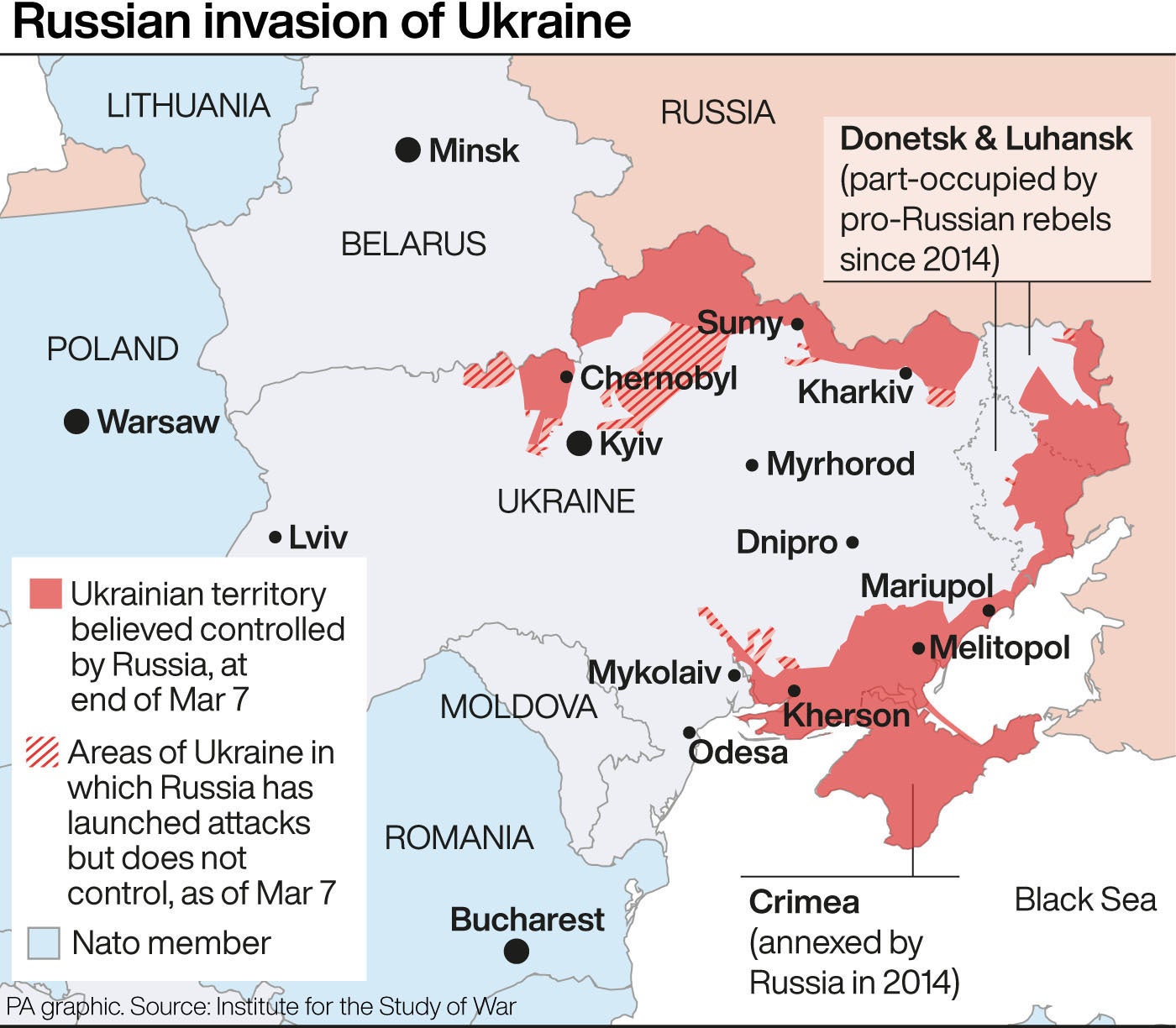UK farmers face ‘existential crisis’ as Ukraine invasion hits grain, energy and fertiliser supplies
Food prices forecast to increase further as producers rush to buy limited stocks of fertiliser and Russia - a key supplier - faces practical embargo on exports
Your support helps us to tell the story
From reproductive rights to climate change to Big Tech, The Independent is on the ground when the story is developing. Whether it's investigating the financials of Elon Musk's pro-Trump PAC or producing our latest documentary, 'The A Word', which shines a light on the American women fighting for reproductive rights, we know how important it is to parse out the facts from the messaging.
At such a critical moment in US history, we need reporters on the ground. Your donation allows us to keep sending journalists to speak to both sides of the story.
The Independent is trusted by Americans across the entire political spectrum. And unlike many other quality news outlets, we choose not to lock Americans out of our reporting and analysis with paywalls. We believe quality journalism should be available to everyone, paid for by those who can afford it.
Your support makes all the difference.UK farmers face an “existential crisis” that will push up food prices, experts have warned, as Russia’s invasion of Ukraine disrupts supplies of grain, and causes energy and fertiliser costs to hit record levels.
European gas prices briefly hit 800p per therm on Monday, almost 20 times the level seen a year ago, as traders processed news of increasing threats to supplies of Russian gas which are vital to keep the lights on across Europe and fuel heavy industries like the production of nitrogen fertiliser.
As Vladimir Putin stepped up Russia’s bombardment of Ukrainian cities, energy markets priced in the prospect of a prolonged conflict in a region so vital to global supplies of wheat that it is known as “the bread basket of Europe”.
Western leaders have stepped up threats of sanctions against Russian oil imports and, although gas is still thought to be off limits, the risk of an embargo is now real. On Monday, Moscow warned of “catastrophic consequences” if Russia is cut off from global markets.
Futures prices - which give an idea of where traders and buyers believe the market will head - indicate energy costs will remain high for at least the next two winters. Agricultural industry leaders warned that it is almost certain to have a major impact on UK farmers’ ability to supply the country’s food needs.
Sky-high gas prices means that nitrogen fertiliser - a crucial input for ensuring crop yields - now costs at least four or five times more than it did a year ago, said Jo Gilbertson, head of fertilisers at the Agricultural Industries Confederation.
He added that energy prices are so volatile that farmers are now finding it difficult to get a firm quote on the price. Infofert, a company that analyses the industry, reported that retailers were “desperate to buy” wheat and corn, fearing that “within hours”, energy and fertliser prices would have moved against them, pushing up the cost of grains.
“Farmers are reluctant to buy fertiliser because they don’t know if they will be able to recover their costs,” said Gilbertson. When carrots are selling for 45p a kilo in Lidl, does that cover a fivefold increase in fertiliser? What is the cost of a potato if fertiliser costs five times what it did?”
It is not just nitrogen that’s at risk. Russia is among the top five exporters of all of the top five major types of fertiliser, including urea, ammonium nitrate and phosphates. Some of those, such as phosphates, are difficult to obtain from elsewhere at the same level of quality.

Gilbertson forecasts an upward spiral in food prices as farmers are forced to either cut back production or buy fertiliser at record high prices. Imports from the EU are unlikely to ease the pain, he said.
“Everyone in Europe's in the same boat, so where we might traditionally have got our fruit and veg from Spain, they are facing exactly the same cost pressures.”
Problems are compounded by the fact that some UK farms are reliant on Ukrainian workers, said Minette Batters, president of the National Farmers’ Union.
Many farmers have held off buying fertilser, hoping in vain that prices will come down. Panic set in last week as Russia launched a full-scale invasion, prompting European farmers to rush to buy limited stocks, pushing prices up still further.
Meanwhile, imports are being disrupted as suppliers fear tougher sanctions on Russian goods. Already there are reports of Russian produced or controlled fertilisers being sold at below market levels in Europe to realize cash, according to Infofert.
While there is no official embargo on Russian fertiliser, a de facto ban is developing because buyers won’t go to Russian ports, insurance companies will not cover vessels coming from the region and banks are unwilling to handle finance or payments. The Kremlin has also advised producers to stop exporting.
That means dairy and livestock farmers in the UK are expected to face a “double whammy”, said Gilbertson, because they can’t afford enough fertiliser to grow grass for their herds and they face huge increases in the cost of alternative feed made from grains.
They are typically not able to stock up on fertiliser in the winter because their herds are kept inside, using up storage space. As a result they will have to stomach record-high market prices, or cut back their herds, meaning less British meat.
“Something's got to give,” said Gilbertson. “We’re on a road where we can’t see where we are going but we know it’s not going to be pleasant.”
Join our commenting forum
Join thought-provoking conversations, follow other Independent readers and see their replies
Comments